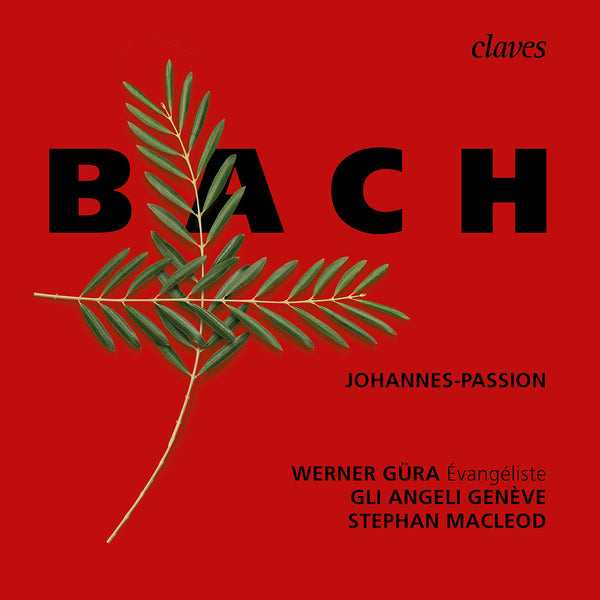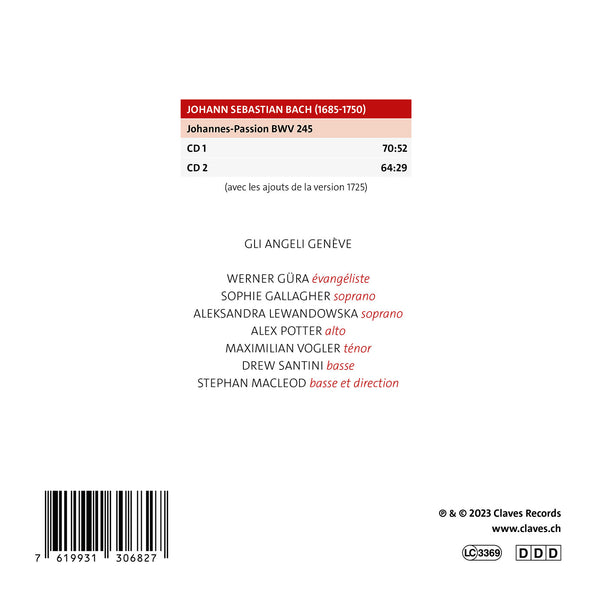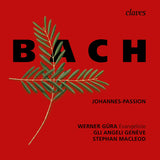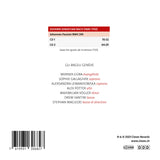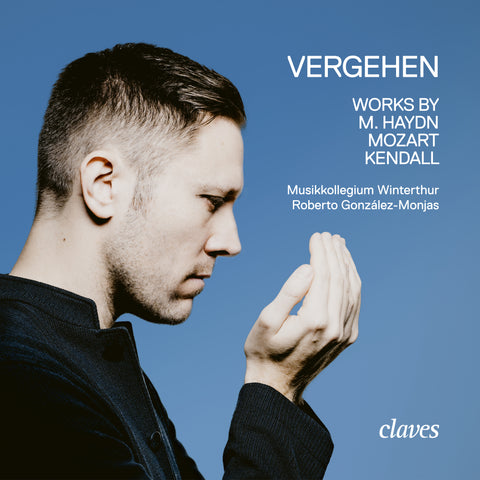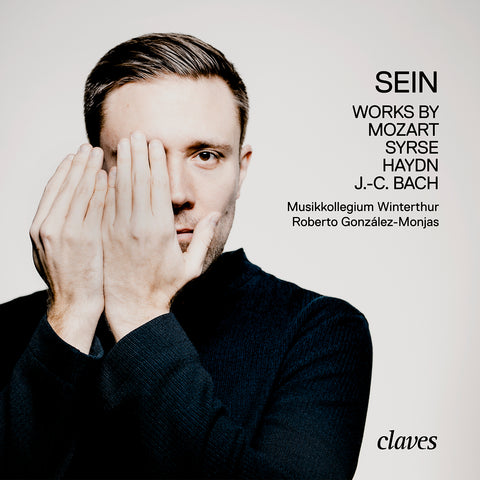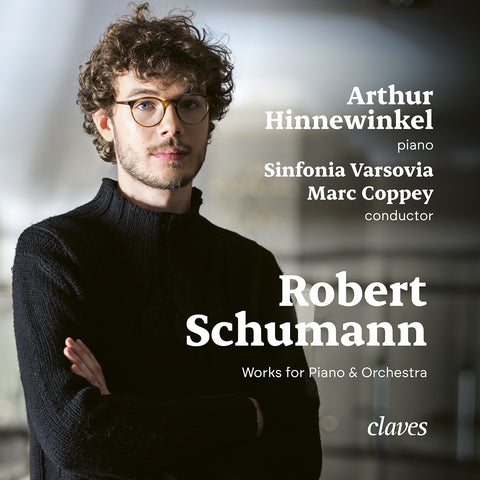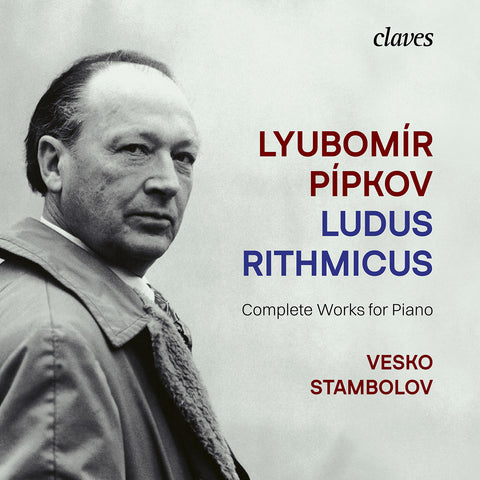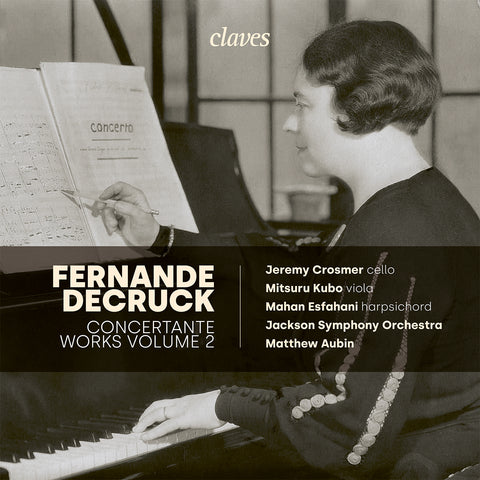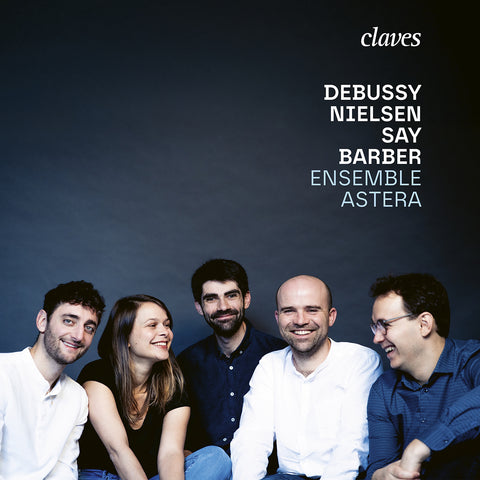(2023) J.S. Bach: Johannes-Passion
Category(ies): Ancient music Oper vocal Repertoire
Vocal(s): Alto Bass (vocal) Soprano Tenor
Main Composer: Johann Sebastian Bach
Ensemble: Gli Angeli Genève
Conductor: Stephan MacLeod
CD set: 2
Catalog N°:
CD 3068/69
Release: 07.04.2023
EAN/UPC: 7619931306827
This album is now on repressing. Pre-order it at a special price now.
CHF 24.00
This album is no longer available on CD.
This album has not been released yet. Pre-order it from now.
CHF 24.00
This album is no longer available on CD.
CHF 24.00
VAT included for Switzerland & UE
Free shipping
This album is no longer available on CD.
VAT included for Switzerland & UE
Free shipping
This album is now on repressing. Pre-order it at a special price now.
CHF 24.00
This album is no longer available on CD.
This album has not been released yet.
Pre-order it at a special price now.
CHF 24.00
This album is no longer available on CD.
CHF 24.00
This album is no longer available on CD.
J.S. BACH: JOHANNES-PASSION
St John Passion (BWV 245)
According to the obituary written by his son Carl Philip Emmanuel and his former pupil Johann Friedrich Agricola, Johann Sebastian Bach composed five Passions, including “one for two choirs” (the St Matthew Passion). However, only two of them have survived in their entirety. A third one, the St Mark Passion, has given rise to various reconstructions, and the last two, if they at all existed, are irretrievably lost. Of the two Passions that have come down to us, the St John Passion was the first to be composed; Bach had it performed for the first time in the St Nicholas Church less than a year after taking up his post in Leipzig, on 7 April 1724 (he had taken the liberty of announcing it to the St Thomas Church, which earned him a reprimand; he got away with a somewhat ironic letter of apology). The work was again performed the following year, this time at St Thomas’, and most likely on further occasions in 1732, 1739 and 1749, with various revisions.
A musical account of Christ’s crucifixion can be traced back to the Middle Ages, but in the early eighteenth century, the narrative took on an oratorio-like form that one finds with most composers of Bach’s generation. It was a kind of apotheosis of music dedicated to liturgical services. Bach had planned three complete cantata cycles culminating with the performance of three Passions during the Lenten period on Good Friday. He conducted 26 of them during his 28-year tenure, repeating his own cantatas on several occasions and introducing those of other composers such as Telemann, Handel and Keiser.
The texts of the Passions associated biblical sources with derived poetic elaborations, such as Barthold Heinrich Brockes’ writings, which inspired several composers; paraphrases thereof are to be found in the St John Passion. These texts were strictly controlled, and Bach had problems with the Consistory in this respect. This might explain why he deleted, among others, the opening chorus, the concluding chorale (“Ach Herr, lass dein lieb Engelein”) and the tenor aria “Ach, mein Sinn” in the 1725 revival of the work. There were further problems with the 1739 revival, and Bach did not revert to the original version’s libretto until 1749, a year before his death. It is unknown whether this was in agreement with the Consistory or a gesture of defiance (but changes sometimes resulted from practical problems related to available performers). The name of the librettist who assembled the St John Passion’s texts is unknown: it was probably Bach himself, in collaboration with an assistant.
The Passion was bound to the service: after the ringing of the bells and a sung motet, its first part was performed, followed by a long sermon; then came the second part of the Passion. The service could last four to five hours; it ended with a motet, a sung verse, an oration and a final chorale. John’s account, which Luther considered the best of the four gospels, is narrated by a tenor voice in secco recitatives (accompanied only by the continuo): this is the voice of the Evangelist; those of the Christ, the apostle Peter and Pontius Pilate, as well as the crowd (known as the “turba”), are inserted in the narration. [..]
Note on the successive versions and the present recording
A performance of the St John Passion, however historically informed, is necessarily a compromise. Indeed, Bach did not leave a definitive version of the work, as he had done for the St Matthew Passion. Nevertheless, he had undertaken such a task in 1732, making systematic changes and bringing improvements to the first quarter of the composition – all of which are taken up in modern editions – but he failed to maintain this effort throughout the entire work.
he performance history of the Passion during Bach’s lifetime can be summarised in five important stages, about which much is known today. These stages took place in 1724, 1725, 1732, 1739 and 1749.
Gli Angeli Genève
Gli Angeli Genève was founded in 2005 by Stephan MacLeod. This ensemble of variable size plays on period instruments (or copies thereof) and comprises musicians who pursue a career in baroque music but are not active in the field of ancient music only. Their eclecticism guarantees freshness and enthusiasm. Since its creation, Gli Angeli Genève has been the meeting point for some of the most famous singers and instrumentalists on the international baroque scene and young graduates of the Basel, Lyon, Lausanne and Geneva music schools. Internationally renowned since its first two recordings in 2009 and 2010, the ensemble now gives more than fifteen concerts per season in Geneva, as part of its complete Bach Cantatas, a series of annual concerts at the Victoria Hall, the annual Haydn-Mozart festival created by the ensemble in 2021, and finally the Chambre des Anges, a new concert series inaugurated in 2022 and devoted to chamber music.
At the same time, the ensemble is in demand in Switzerland and abroad to perform Bach, but also Tallis, Josquin, Schein, Schütz, Johann Christoph Bach, Weckmann, Buxtehude, Rosenmüller, Haydn, Mozart, etc. In recent seasons, Gli Angeli Genève has been in residence at the Utrecht Festival and the Thüringer Bachwochen, and has also given concerts in Basel, Zurich, Lucerne, Barcelona, Nürnberg, Bremen, Stuttgart, Brussels, Milan, Wroclaw, Paris, Ottawa, Vancouver, Amsterdam and The Hague. Gli Angeli Genève is a regular guest at the Festivals of Saintes, Utrecht, Musikfest Bremen and the Bach Festival in Vancouver. In 2017 the ensemble made its debut at the Grand Théâtre de Genève and in 2019 at the KKL in Lucerne. On the occasion of the Haydn- Mozart Festival, Gli Angeli Genève collaborates with guest conductors and artists: Michel Corboz in 2021, Kristian Bezuidenhout in 2022 and Philippe Herreweghe in 2023.
Gli Angeli Genève’s first recording for Claves Records, Sacred Music of the 17th Century in Wroclaw, won the 2019 ICMA award for best Baroque Vocal Recording of the Year, and Johann Sebastian Bach’s St. Matthew Passion was enthusiastically received by audiences and critics in Switzerland and around the world. The ensemble’s discography also includes a Bach Mass in B minor, nominated for an ICMA 2022 award, Bach’s Bass Cantatas, and the rare Symphonies Concertantes by Antoine Reicha, with soloists Christophe Coin, Davit Melkonyan, Chouchane Siranossian and Alexis Kossenko. The last CD released in October 2022, Mozart’s Concertos for flute and orchestra, with Alexis Kossenko (flute) and Valeria Kafelnikov (harp) has been nominated for an ICMA 2023 award in the “Concerto” category.
Gli Angeli Genève has a regional support agreement with the City of Geneva, the Republic and Canton of Geneva and the Théâtre du Crochetan.
Stephan MacLeod, bass & direction
Stephan MacLeod was born in Geneva and studied singing in his native city, in Cologne and in Lausanne. His concert career began during his studies in Germany with a fruitful collaboration with Reinhard Goebel and Musica Antiqua Köln. Since then he has performed regularly with conductors such as Leonhardt, Herreweghe, Savall, Suzuki, Kuijken, Corboz, Brüggen, Kossenko, Pierlot, Luks, Mortensen, Harding, Junghänel, Rademann, Pichon, Van Immerseel, Coin, Rilling, Van Nevel and Bernius. He is the founder and conductor of the Ensemble Gli Angeli Genève, which gives some thirty concerts each year throughout the world, and he is regularly invited to conduct other ensembles (OSR, Philharmonie Zuidnerderland, Nederlandse Bachvereniging, etc.). More than 100 CDs, many of which have received critical acclaim, document his work. He has been professor of voice at the Haute Ecole de Musique de Lausanne since 2013 and will be at the Haute Ecole de Musique de Genève from September 2023.
Translated from French by www.DeepL.com/Translator (free version)
Source: gliangeligeneve.com
REVIEWS
« Qu’on se rassure : les quelque vingt-cinq minutes d’écart que signalent les minutages respectifs de ces deux versions ne traduisent nullement de saisissantes différences de tempo, Lars Ulrik Mortensen et Stephan MacLeod adoptant à peu près les mêmes. [..] La version suisse présente une belle respiration interne, des lignes souples, des chorals qui se déploient et soignent leurs fins de phrases, et une narration plus poétique que dramatique. Sans remettre en cause la suprématie de l’enregistrement théâtral et inspiré de Gardiner (Soli Deo Gloria, 2003, CHOC, CLASSICA n° 132), ces deux interprétations ne manquent pas d’atouts. À chacun de choisir selon sa sensibilité. » - Philippe Venturini, juin 2023
« [..] Gli Angeli achèvent leur tour d’horizon des grandes œuvres chorales de Bach. Faute de constance dans l’engagement, la Passion selon saint Matthieu et la Messe en si (cf. nos 691 et 700) n’avaient pas toujours tenu leurs promesses. La Passion selon saint Jean marque une indéniable amélioration sur ce plan. Si l’on a connu chœur d’entrée plus fervent I 69 (il ne suffit pas d’avancer), Stephan MacLeod parvient à instaurer une dynamique qui assure à l’œuvre cohérence et progression. Il est aidé dans cette tâche par un Werner Güra très en verve, qui tient son rôle d’Evangéliste avec maîtrise et conviction. Saluons aussi des instrumentistes, emmenés par Leila Schayegh, capables de prendre la musique à bras-le-corps mais aussi de faire valoir, en finesse, une palette de couleurs séduisante. [..] » - Jean-Christophe Pucek, juin 2023
« [..] Schon der Einleitungschor legt eine Qualität der Aufnahme offen: natürlich wirkender Gesang mit sehr guter Durchhörbarkeit. Hilfreich dafür ist gewiss auch, dass die Tempi eigentlich nie überzogen werden; dennoch entwickeln die Turbae nicht nur Drive, sondern auch eine unmittelbare Wirkkraft. Auf Letztere zielt auch der Vortrag von Werner Güra, der einen ungemein mitfühlenden Evangelisten gibt. Man glaubt ihm die Anteilnahme nicht zuletzt auch wegen mancher freier Tempi, die eben die Gefühlsebene widerspiegeln können. Auch die Choräle profitieren von recht markanter Textausdeutung, die aber nie künstlich wirkt. Das Orchester geht ebenfalls sehr flexibel auf die jeweiligen Stimmungslagen ein und stützt die Vokalisten ausgezeichnet. Ganz besonders kommt die Affektumsetzung natürlich in der Sterbeszene zur Geltung. So gefühlvoll und anrührend bekommt man diese wirklich selten zu hören. » - Reinmar Emans, September 2023
« Poursuivant sur la lancée de sa très belle «Passion selon saint Matthieu » et de la «Messe en si», l’ensemble Gli Angeli Genève livre sa version de la «Passion selon saint Jean», de Bach, avec grosso modo la même équipe de rêve compacte et virtuose. Ses huit solistes forment le choeur, enrichi par la présence toujours percutante de l’évangéliste Werner Güra. Stephan MacLeod, à la fois chef et basse incarnant Judas, Pierre et Pilate, propose une traversée vivante et sensible de l’oeuvre, sans jamais verser dans l’excès de dramatisme, avec un orchestre d’une splendide réactivité. Cette passion ayant connu différentes variantes, Gli Angeli complète l’habituelle version de 1724 révisée en 1739 par les ajouts de celle de 1725. Une nouvelle référence! » - Matthieu Chenal, avril 2023
« L’ensemble Gli Angeli est venu à Bulle il y a un mois interpréter la Passion selon saint Matthieu. La même qui avait comblé le vide en 2020, à sa sortie discographique, en plein confinement. Aujourd’hui, c’est la première et la plus dense des deux composées par Bach, la Passion selon saint Jean, qui paraît, toujours chez Claves. Les chanteurs et instrumentistes réunis autour du chef genevois Stephan MacLeod ont les mêmes qualités de fraîcheur, d’implication: avec eux, la musique de Bach vibre, on la sent vivante, présente, incarnée. Même sans jamais forcer le trait, la géniale théâtralisation opère, par la diversité des styles, par les effets qui amplifient le récit. L’ensemble porte un grand soin à la beauté des timbres et des couleurs instrumentales. S’il ne fallait garder qu’une version… Une splendeur! » Elisabeth Hass, avril 2023
“Despite some shortcomings, this is one of the better performances of the St John Passion” - Johan van Veen, march 2024
(2023) J.S. Bach: Johannes-Passion - CD 3068/69
St John Passion (BWV 245)
According to the obituary written by his son Carl Philip Emmanuel and his former pupil Johann Friedrich Agricola, Johann Sebastian Bach composed five Passions, including “one for two choirs” (the St Matthew Passion). However, only two of them have survived in their entirety. A third one, the St Mark Passion, has given rise to various reconstructions, and the last two, if they at all existed, are irretrievably lost. Of the two Passions that have come down to us, the St John Passion was the first to be composed; Bach had it performed for the first time in the St Nicholas Church less than a year after taking up his post in Leipzig, on 7 April 1724 (he had taken the liberty of announcing it to the St Thomas Church, which earned him a reprimand; he got away with a somewhat ironic letter of apology). The work was again performed the following year, this time at St Thomas’, and most likely on further occasions in 1732, 1739 and 1749, with various revisions.
A musical account of Christ’s crucifixion can be traced back to the Middle Ages, but in the early eighteenth century, the narrative took on an oratorio-like form that one finds with most composers of Bach’s generation. It was a kind of apotheosis of music dedicated to liturgical services. Bach had planned three complete cantata cycles culminating with the performance of three Passions during the Lenten period on Good Friday. He conducted 26 of them during his 28-year tenure, repeating his own cantatas on several occasions and introducing those of other composers such as Telemann, Handel and Keiser.
The texts of the Passions associated biblical sources with derived poetic elaborations, such as Barthold Heinrich Brockes’ writings, which inspired several composers; paraphrases thereof are to be found in the St John Passion. These texts were strictly controlled, and Bach had problems with the Consistory in this respect. This might explain why he deleted, among others, the opening chorus, the concluding chorale (“Ach Herr, lass dein lieb Engelein”) and the tenor aria “Ach, mein Sinn” in the 1725 revival of the work. There were further problems with the 1739 revival, and Bach did not revert to the original version’s libretto until 1749, a year before his death. It is unknown whether this was in agreement with the Consistory or a gesture of defiance (but changes sometimes resulted from practical problems related to available performers). The name of the librettist who assembled the St John Passion’s texts is unknown: it was probably Bach himself, in collaboration with an assistant.
The Passion was bound to the service: after the ringing of the bells and a sung motet, its first part was performed, followed by a long sermon; then came the second part of the Passion. The service could last four to five hours; it ended with a motet, a sung verse, an oration and a final chorale. John’s account, which Luther considered the best of the four gospels, is narrated by a tenor voice in secco recitatives (accompanied only by the continuo): this is the voice of the Evangelist; those of the Christ, the apostle Peter and Pontius Pilate, as well as the crowd (known as the “turba”), are inserted in the narration. [..]
Note on the successive versions and the present recording
A performance of the St John Passion, however historically informed, is necessarily a compromise. Indeed, Bach did not leave a definitive version of the work, as he had done for the St Matthew Passion. Nevertheless, he had undertaken such a task in 1732, making systematic changes and bringing improvements to the first quarter of the composition – all of which are taken up in modern editions – but he failed to maintain this effort throughout the entire work.
he performance history of the Passion during Bach’s lifetime can be summarised in five important stages, about which much is known today. These stages took place in 1724, 1725, 1732, 1739 and 1749.
Gli Angeli Genève
Gli Angeli Genève was founded in 2005 by Stephan MacLeod. This ensemble of variable size plays on period instruments (or copies thereof) and comprises musicians who pursue a career in baroque music but are not active in the field of ancient music only. Their eclecticism guarantees freshness and enthusiasm. Since its creation, Gli Angeli Genève has been the meeting point for some of the most famous singers and instrumentalists on the international baroque scene and young graduates of the Basel, Lyon, Lausanne and Geneva music schools. Internationally renowned since its first two recordings in 2009 and 2010, the ensemble now gives more than fifteen concerts per season in Geneva, as part of its complete Bach Cantatas, a series of annual concerts at the Victoria Hall, the annual Haydn-Mozart festival created by the ensemble in 2021, and finally the Chambre des Anges, a new concert series inaugurated in 2022 and devoted to chamber music.
At the same time, the ensemble is in demand in Switzerland and abroad to perform Bach, but also Tallis, Josquin, Schein, Schütz, Johann Christoph Bach, Weckmann, Buxtehude, Rosenmüller, Haydn, Mozart, etc. In recent seasons, Gli Angeli Genève has been in residence at the Utrecht Festival and the Thüringer Bachwochen, and has also given concerts in Basel, Zurich, Lucerne, Barcelona, Nürnberg, Bremen, Stuttgart, Brussels, Milan, Wroclaw, Paris, Ottawa, Vancouver, Amsterdam and The Hague. Gli Angeli Genève is a regular guest at the Festivals of Saintes, Utrecht, Musikfest Bremen and the Bach Festival in Vancouver. In 2017 the ensemble made its debut at the Grand Théâtre de Genève and in 2019 at the KKL in Lucerne. On the occasion of the Haydn- Mozart Festival, Gli Angeli Genève collaborates with guest conductors and artists: Michel Corboz in 2021, Kristian Bezuidenhout in 2022 and Philippe Herreweghe in 2023.
Gli Angeli Genève’s first recording for Claves Records, Sacred Music of the 17th Century in Wroclaw, won the 2019 ICMA award for best Baroque Vocal Recording of the Year, and Johann Sebastian Bach’s St. Matthew Passion was enthusiastically received by audiences and critics in Switzerland and around the world. The ensemble’s discography also includes a Bach Mass in B minor, nominated for an ICMA 2022 award, Bach’s Bass Cantatas, and the rare Symphonies Concertantes by Antoine Reicha, with soloists Christophe Coin, Davit Melkonyan, Chouchane Siranossian and Alexis Kossenko. The last CD released in October 2022, Mozart’s Concertos for flute and orchestra, with Alexis Kossenko (flute) and Valeria Kafelnikov (harp) has been nominated for an ICMA 2023 award in the “Concerto” category.
Gli Angeli Genève has a regional support agreement with the City of Geneva, the Republic and Canton of Geneva and the Théâtre du Crochetan.
Stephan MacLeod, bass & direction
Stephan MacLeod was born in Geneva and studied singing in his native city, in Cologne and in Lausanne. His concert career began during his studies in Germany with a fruitful collaboration with Reinhard Goebel and Musica Antiqua Köln. Since then he has performed regularly with conductors such as Leonhardt, Herreweghe, Savall, Suzuki, Kuijken, Corboz, Brüggen, Kossenko, Pierlot, Luks, Mortensen, Harding, Junghänel, Rademann, Pichon, Van Immerseel, Coin, Rilling, Van Nevel and Bernius. He is the founder and conductor of the Ensemble Gli Angeli Genève, which gives some thirty concerts each year throughout the world, and he is regularly invited to conduct other ensembles (OSR, Philharmonie Zuidnerderland, Nederlandse Bachvereniging, etc.). More than 100 CDs, many of which have received critical acclaim, document his work. He has been professor of voice at the Haute Ecole de Musique de Lausanne since 2013 and will be at the Haute Ecole de Musique de Genève from September 2023.
Translated from French by www.DeepL.com/Translator (free version)
Source: gliangeligeneve.com
REVIEWS
« Qu’on se rassure : les quelque vingt-cinq minutes d’écart que signalent les minutages respectifs de ces deux versions ne traduisent nullement de saisissantes différences de tempo, Lars Ulrik Mortensen et Stephan MacLeod adoptant à peu près les mêmes. [..] La version suisse présente une belle respiration interne, des lignes souples, des chorals qui se déploient et soignent leurs fins de phrases, et une narration plus poétique que dramatique. Sans remettre en cause la suprématie de l’enregistrement théâtral et inspiré de Gardiner (Soli Deo Gloria, 2003, CHOC, CLASSICA n° 132), ces deux interprétations ne manquent pas d’atouts. À chacun de choisir selon sa sensibilité. » - Philippe Venturini, juin 2023
« [..] Gli Angeli achèvent leur tour d’horizon des grandes œuvres chorales de Bach. Faute de constance dans l’engagement, la Passion selon saint Matthieu et la Messe en si (cf. nos 691 et 700) n’avaient pas toujours tenu leurs promesses. La Passion selon saint Jean marque une indéniable amélioration sur ce plan. Si l’on a connu chœur d’entrée plus fervent I 69 (il ne suffit pas d’avancer), Stephan MacLeod parvient à instaurer une dynamique qui assure à l’œuvre cohérence et progression. Il est aidé dans cette tâche par un Werner Güra très en verve, qui tient son rôle d’Evangéliste avec maîtrise et conviction. Saluons aussi des instrumentistes, emmenés par Leila Schayegh, capables de prendre la musique à bras-le-corps mais aussi de faire valoir, en finesse, une palette de couleurs séduisante. [..] » - Jean-Christophe Pucek, juin 2023
« [..] Schon der Einleitungschor legt eine Qualität der Aufnahme offen: natürlich wirkender Gesang mit sehr guter Durchhörbarkeit. Hilfreich dafür ist gewiss auch, dass die Tempi eigentlich nie überzogen werden; dennoch entwickeln die Turbae nicht nur Drive, sondern auch eine unmittelbare Wirkkraft. Auf Letztere zielt auch der Vortrag von Werner Güra, der einen ungemein mitfühlenden Evangelisten gibt. Man glaubt ihm die Anteilnahme nicht zuletzt auch wegen mancher freier Tempi, die eben die Gefühlsebene widerspiegeln können. Auch die Choräle profitieren von recht markanter Textausdeutung, die aber nie künstlich wirkt. Das Orchester geht ebenfalls sehr flexibel auf die jeweiligen Stimmungslagen ein und stützt die Vokalisten ausgezeichnet. Ganz besonders kommt die Affektumsetzung natürlich in der Sterbeszene zur Geltung. So gefühlvoll und anrührend bekommt man diese wirklich selten zu hören. » - Reinmar Emans, September 2023
« Poursuivant sur la lancée de sa très belle «Passion selon saint Matthieu » et de la «Messe en si», l’ensemble Gli Angeli Genève livre sa version de la «Passion selon saint Jean», de Bach, avec grosso modo la même équipe de rêve compacte et virtuose. Ses huit solistes forment le choeur, enrichi par la présence toujours percutante de l’évangéliste Werner Güra. Stephan MacLeod, à la fois chef et basse incarnant Judas, Pierre et Pilate, propose une traversée vivante et sensible de l’oeuvre, sans jamais verser dans l’excès de dramatisme, avec un orchestre d’une splendide réactivité. Cette passion ayant connu différentes variantes, Gli Angeli complète l’habituelle version de 1724 révisée en 1739 par les ajouts de celle de 1725. Une nouvelle référence! » - Matthieu Chenal, avril 2023
« L’ensemble Gli Angeli est venu à Bulle il y a un mois interpréter la Passion selon saint Matthieu. La même qui avait comblé le vide en 2020, à sa sortie discographique, en plein confinement. Aujourd’hui, c’est la première et la plus dense des deux composées par Bach, la Passion selon saint Jean, qui paraît, toujours chez Claves. Les chanteurs et instrumentistes réunis autour du chef genevois Stephan MacLeod ont les mêmes qualités de fraîcheur, d’implication: avec eux, la musique de Bach vibre, on la sent vivante, présente, incarnée. Même sans jamais forcer le trait, la géniale théâtralisation opère, par la diversité des styles, par les effets qui amplifient le récit. L’ensemble porte un grand soin à la beauté des timbres et des couleurs instrumentales. S’il ne fallait garder qu’une version… Une splendeur! » Elisabeth Hass, avril 2023
“Despite some shortcomings, this is one of the better performances of the St John Passion” - Johan van Veen, march 2024
Return to the album | Read the booklet | Composer(s): Johann Sebastian Bach | Main Artist: Stephan MacLeod






